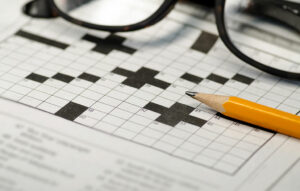Crossword Puzzles of Our Lives (Looking Outside In and Inside Out)

My grandfather, one of the wisest men I’ve ever known, would find great joy every Sunday after church spending hours trying to complete the NYT crossword puzzle. As a USPS letter carrier for over thirty years, his capacity to love life and his ability to bring joy to others were integral parts of his character. I admired his thoughtfulness, curiosity, and ability to have fun.
As my grandfather got older, before the onset of Parkinson’s, he and my youngest sister would spend countless hours contemplating clues and collaborating to find the missing pieces of a particular puzzle. Focused as a team on the challenge of that puzzle, their time together created a priceless bond.
I reached out to my sister to ask about her experience of those times. She shared some life lessons and a surprising insight. Many times she’d get frustrated and Grandfather would offer her words of encouragement: “Stay with it, we’re so close,” “If we give up now, we’ll have to start all over later. We’ve invested all this time and we’re in the right mindset now.”
It turns out that crossword puzzles represent a great metaphor for our professional and personal lives. Consider the following characteristics of The New York Times crossword puzzle (source https://en.m.wikipedia.org/wiki/The_New_York_Times_crossword_puzzle):
They become increasingly difficult throughout the week, with the easiest puzzle on Monday and the most difficult puzzle on Saturday.

In our professional and personal responsibilities, we all face times of growing uncertainty or anxiety when it would just be easier to give up. At those times we could all use words of encouragement from ourselves or from others to “stick with it,” while we give ourselves permission to simply ease the throttle back and become aware that we’re trying too hard to solve the puzzle. Perhaps we should simply give ourselves a rest and pick up tomorrow where we left off; that said, let’s not forget that sometimes the finish line, or answer, is right around the proverbial corner.
Significant events or challenges can get our attention and change our perception. (the motivating impulse for the Times to finally run the puzzle appears to be the bombing of Pearl Harbor so readers might have something to occupy themselves during blackouts)
Unexpected life events like a serious diagnosis or loss of a loved one can significantly impact our outlook and quickly recalibrate our priorities. When that occurs, it’s important to spend time on what matters most, before life throws us another curveball. Many of us are aware of the importance of work/life balance; however, all too often it’s an afterthought, or an issue we wish to save for retirement.
Many Times puzzles have a theme that connects at least three long answers; another theme type is humor. For example, the February 11, 2004, puzzle by Ethan Friedman featured a theme quotation:
ANY IDIOT CAN FACE / A CRISIS IT’S THIS / DAY-TO-DAY LIVING / THAT WEARS YOU OUT.
The crossword puzzles of our lives have themes that range from: financial (short-term vs. long-term, quantity vs. quality), physical (our personal health and others we care about), emotional (personal and professional relationships, our mental health and that of our loved ones), and spiritual (unique to each of us, being present and practicing gratitude).
Instead of asking traditional questions like: “How do I feel?” “How will I ever?” “What do I do now?” consider these three questions to create connections between the black squares of our lives:
- Where am I now?
- Where do I want to be?
- How do I get there?
The most difficult puzzle days are usually un-themed and “wide open,” with fewer black squares (usually used to assist with the beginning and end of themes) and more long words.

Life will always have its ups and downs, sometimes allowing us to approach it with wonderful curiosity, or during overwhelmingly difficult times, leaving us clueless. While wonderful experiences do bring us joy, navigating challenges and surviving times of excessive uncertainty don’t always feel like they build character or help us develop a great sense of humor.
My sister shared a surprising insight regarding my grandfather’s ability to solve difficult puzzles: “sometimes he would cheat!” What?! She found out that my grandfather had invested in a NYT Crossword Puzzle Resource, a book to assist with the more challenging editions. This fact became a great reminder to both of us that with some of life’s most difficult puzzles, it’s fine to engage either an internal or external resource for assistance.
Nearly all the crossword grids have rotational symmetry: they can be rotated 180 degrees and remain identical.
Sometimes when trying to help others who are feeling vulnerable, we can begin to feel overwhelmed ourselves. It’s important in those situations to also be aware of the opposite states of mind: taking care of oneself or being too critical of others. When intense emotions flare up, our health depends on achieving and maintaining a reasonable balance.
The answer word will never appear in the clue itself.
Life’s challenges could certainly be more easily overcome if someone would just give us the answer. Fortunately, if we take the time to slow down and listen to ourselves, many times we become aware of clues. Practicing puzzles on all levels of difficulty expands our vocabulary, possibly making difficult puzzles today easier to solve tomorrow.

Any time a clue ends in a question mark, the answer is a play on words.
Often when we take the time to ask questions, answers come in the form of other questions. These questions are real and not just a play on words. Taking the time to reflect on and seek out the answers to these questions can provide tremendous insight and direction. Consider asking, ‘What are the questions I have, that if I had the answers to them, would change the situation?’
Slowing down to pay close attention to our emotional energy levels and the values that matter most to us, as they pertain to specific themes in daily life, can allow us to fill in the blanks of our professional or personal puzzles to arrive at sustainable, practical best next steps. Giving ourselves the time to approach our daily challenges as we would a crossword puzzle, allows us to be creative in our problem solving approach, and accept that some solutions to the puzzle may be elusive. Then we may need to study other sections of the puzzle and consider how they fit together, giving us new clues that provide insight. Perhaps the most difficult puzzles might require both some internal reflection and a request for assistance from an external resource. Giving ourselves permission to not know all the answers, to discover the meanings of new words, and to realize that some puzzles are much more difficult than others, can help us to both manage uncertainty and grow in confidence.
Want to stay up-to-date on our latest articles? Click here to read more and to join our mailing list!
About the Authors
Jonathan Thomas, MSW
Whether at the potter's wheel, coaching medical professionals and teams, or in his private counseling practice, Jonathan Thomas has spent his life molding, shaping and creating something beautiful and new.
Tim Preston
As a successful serial-entrepreneur and angel investor, Tim Preston has spent the majority of his life learning, overcoming, and creating, from blank pieces of paper: self, spaces, teams, and businesses.
Together, Jonathan and Tim founded Simple. Not Easy., LLC, a company that developed CoreSelf Positioning™ tools to help companies and individuals to slow down and align energy levels, values, and actions in order to formulate their best next steps.
Learn more about Jonathan, Tim & CoreSelf Positioning.